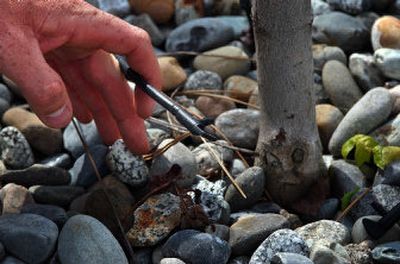Conservation sought in Liberty Lake

The well hasn’t run dry in Liberty Lake – at least not yet.
But officials at the Liberty Lake Sewer and Water District are looking ahead to a time when the city has twice as many homes and double the water needs, and they’re hoping city officials will find ways to make citizens use less water.
“Water conservation becomes a more and more important issue with all the studies and issues going on with the aquifer,” said F. Lee Mellish, general manager of the district. “We need to use it to our best advantage.”
The district has had applications waiting for 14 years for water rights, but those applications are on hold while a large aquifer study is completed. Spokane and Spokane Valley have enough water rights to cover twice their current populations, but Liberty Lake only has enough rights to cover its current population.
Officials at the district – formed in 1973 and covering an area stretching from Liberty Lake to the Spokane River – are hoping members of the Liberty Lake City Council will pass laws requiring new homes to use water-saving measures in their landscaping.
Summer landscaping irrigation accounts for 47 percent of the district’s total water use, said BiJay Adams, the district’s lake protection manager. By installing moisture sensors in lawns, or using more drought-resistant plants, customers can cut their water use dramatically, he said.
“There are things that people can do that are relatively inexpensive,” Adams said. “We know it’s attainable. It’s just a matter of people trying to follow through.”
District Commissioner Frank Boyle has been attending Liberty Lake City Council meetings for several months and often asks the city to take action on water conservation measures. Boyle said although a few council members have spoken with him privately, nothing has been done.
“I just don’t understand why the city of Liberty Lake can’t come up to the forefront and be environmentally friendly,” Boyle said. “We’re going to do water conservation, and it would be nice if we could get the city’s cooperation.”
Some of the difficulty might stem from the city’s 2003 attempt to take over the district, which created high legal bills and animosity between the two entities, district Commissioner Harley Halverson said.
“I think we’re still seeing a little bit of the ramifications of the assumption causing difficulty between the district and the city,” Halverson said. “Both sides are trying to overcome that and put that in the past.”
Liberty Lake Mayor Steve Peterson said the city is open to recommending that people conserve water, but there is no need for laws telling them what to do.
“From my standpoint I don’t believe in legislating what people should have in their yards or how they should water things,” Peterson said. “It makes more sense to educate rather than regulate.”
Both the city and the district are trying to lead by example and have taken steps to reduce their own water consumption.
The city used dry landscaping on parts of Harvard Road north of the freeway, and it plans on removing grass and replanting portions of Molter Road with drought-resistant plants this summer, Peterson said.
The Sewer and Water District building on Mission Avenue received an upgrade to its sprinkler system, including a moisture sensor that measures the amount of water in the soil and only turns on the water when the grass is dry enough. The district also tore out more than 2,000 square feet of grass and replanted it with more drought-resistant and native plants. The measures lowered the building’s water use by 40 percent.
The district offers incentives to people who use water-conservation techniques in their new homes, and Adams serves as a certified irrigation auditor, who for no cost will examine a sprinkler system to find inefficient and wasteful areas.